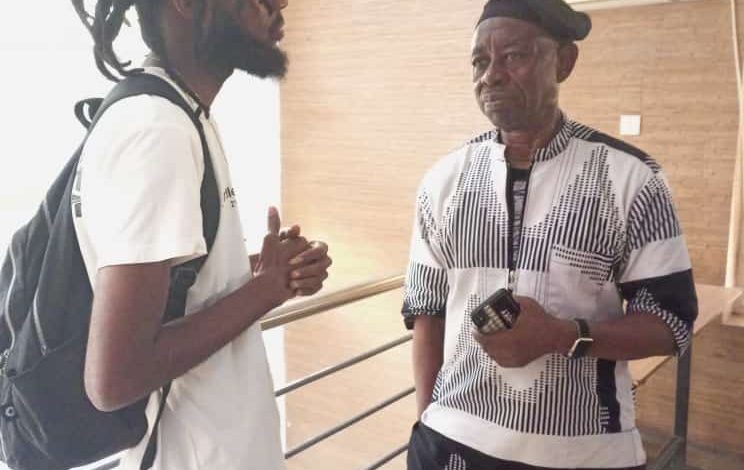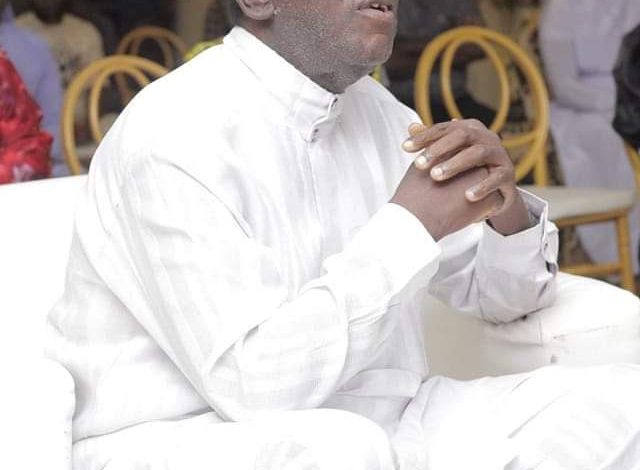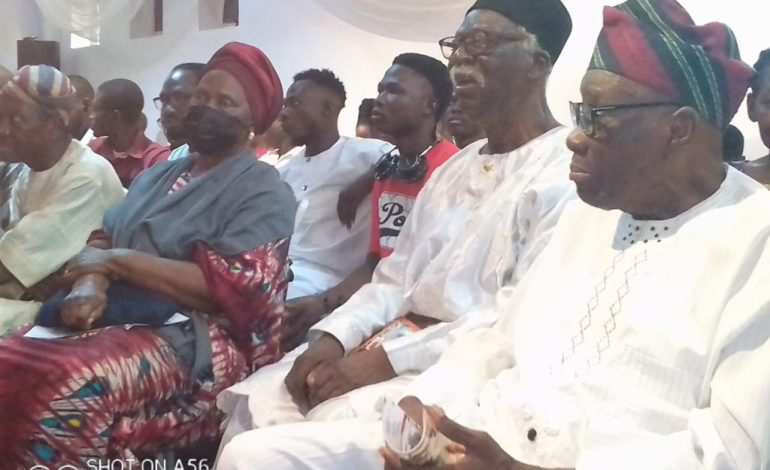Canvassing citizens’ eternal vigilance as LABAF 2022 opens on political note

By Anote Ajeluorou
LAGOS Book and Art Festival (LABAF 2022), which prides itself as the feast of ‘ideas and life’ dedicated to the promotion of ‘literacy, empowerment and development’ with the aim of ‘saving our (common) humanity,’ opened on Monday, November 14, at its regular Freedom Park, Lagos Island home to feverish activities. Board of Trustees’ chairman of Committee for Relevant Art (CORA), Chief Kayode Aderinokun declared the festival open, as he addressed the youths who eagerly awaited LABAF’s exciting festival programming.
Aderinokun admonished them to use their technology and energy wisely especially in next year’s elections. He said while the old men and woman of his generation might have failed in charting a proper course for the country, the youths could not also fail, although he said youths could not absolve themselves completely from the failures of their elders, as they largely made up the large crowds that gather around politicians before and during elections. He said it was time youths lived up to their ‘Sorosoke’ mantra, so a better Nigeria could be ushered in during next year’s election.

Although the advertised ‘Youths Summit’ by Praxis HangOut could not hold due to some hitches from the Abuja end, veteran filmmaker Tunde Kelani stepped in to fill the void with his 1999 film Saworoide. He spoke about the inspiration behind it, calling the film one of four of his ‘Conscience’ films that set out to sensitise society and its citizens about their political rights and possible ways to go about enforcing them, so that political merchants of various shades do not subvert and hijack the levers of power, and ultimately use such usurped powers to harm society. Saworoide was produced shortly after successive repressive military regimes in Nigeria in 1999. Kelani said Saworoide and its sequel effectively answer the question of eternal vigilance required of citizens in the political development of society, how citizens needed to keep a keen eye on their leaders so they do not derail from the social contract they enter with the people, saying the possibility of leaders veering off tangent with the allure that power confers is all too real and irresistible.
Interestingly, Saworoide is as relevant in 1999 when it declaimed the military and bad governance, as it is even today that Nigeria stands on the brink of another political transition. Very often the fever of electioneering ultimately dulls citizens’ vigilance when elected officials would have taken office, and thereby emboldening leaders to be reckless and behave the way they like to the harm of society. Kelani’s Saworoide is a standard political filmic treatise that is timeless in its thematic preoccupation. It’s a timeless political education that Nigerians must never be tired of availing themselves of.

After Saworoide’s sobering political message, the audience was taken on a voyage of LABAF’s Booktrek, a brief excursion into some recently publish books that also speak to the urgent socio-political and cultural issues of our time. First on the bill was Janine Odogu’s (aka Nwanyi Ocha – white woman) Ala Nnam (My Father’s Land – Purple Shelves, Lagos), a children’s illustrative and colourful storybook written by a white woman married to a Nigerian Igbo man. Odogu’s children’s book is revolutionary in intent, as she first wrote it in Igbo and then translated it into English. She confessed her love for the Igbo language, having married an Igbo man, of course, and then having children for him who she felt needed to be raised to be able to speak and write their father’s language even though they do not live in Nigeria. She said she wanted her children to learn the language of their father, and the only way she could achieve that was to produce a book that would serve the purpose, so her children could read and speak their father’s Igbo language. Ala Nnam does so expertly.
Nwanyi Ocha’s effort in writing a book in Igbo and then translating it into English is both culturally and politically audacious, and especially humbling for Nigerians and Africans who shun their mother tongues in preference of adopted languages for their children at home. Indeed, while many Nigerians are running away from their own mother tongues, a foreigner is running smack into it, has embraced it and is advancing it to a global audience. After Udogu read from the Igbo version, she then read the English translation, the audience was blown away by her star performance. The Igbo in the audience were full of praise for her pacesetting work. Nwanyi Ocha joined virtually from her European abode.
Thereafter, Dotun Famoriyo read from his new playlet Better Tomorrow (Quantum G. Concept, Lagos). Set against the backdrop of some events that happened in his class in secondary school, Famoriyo said his play speaks to young people’s deviant behaviour and how they should listen to their parents, so they do not end up in situations that are not edifying. This was followed immediately by Ifenna Grace Okeke who read and spoke about her novel Dead Bones Do Not Rise Again (Purple Shelves, Lagos) due to be launched on Thursday, November 17, 2022 at the ongoing LABAF ’22 at the museum at Freedom Park. Okeke said Nigerians were always in denial of the evidently reality before them, such as when a man falls ill and shuns taking medicine and prefers to pray instead. She juxtaposes Nigerians’ views on Christianity and their belief in African religion, which some ultimately run to when push comes to shove. Her book generated a lot of interest and reaction from the audience, as it spoke to the ambivalence of faith that is so common among Nigerians.
Sunday Akande then took the floor with his satirical, sensational book, Soro Soke: 20.10.20 (Worital Global, Lagos), a book he said he started writing in 2013 when he had a feeling of déjà vu of what would possibly happen years ahead. Akande said he’d known in his bones that Nigeria’s political trajectory was bound to hit a certain milestone in future and started writing his futuristic novel. But it stalled for a bit, and then 20.10.20 Lekki Tollgate saga happened, and he finished the satirical novel in a few days after. Laced with hilarious scenes, Akande has ground out a testament to Nigeria’s youth uprising that he believes would have far-teaching consequences for Nigeria’s leadership and citizenry going forward, adding that Nigeria’s leadership would not be the same again, as governance will not be as usual, adding that the culture of youths’ political consciousness and vigilance have been entrenched into the national psyche as against the docility that had prevailed before now.
The Bible Destiny of Africa (Purple Shelves, Lagos) by Archbishop Doye Agama was next on the Booktrek train. He joined virtually from his base in England. Agama’s book locates Africa as the central setting of most of what happened in the bible, saying certain factors made Africa to lose its pre-eminent position in taking ownership of the bible story before the Europeans appropriated and deployed it for their quest for world domination. The cleric said everything in the bible ties with Africa’s destiny, and reeled out scenes and scenarios that explicitly do so to the amazement of the audience. Agama’s book generated so much interest and controversy even as it is due to be unveiled on Thursday, November 17, 2022 at the festival venue.

Lastly on the Booktrek for Day 1 of LABAF ’22 was a special feature ‘The Scrapyard Bard, Eric Obuh’ from a section of the non-fiction book, Lagos Supernatural City (Hurst & Company, London) by Tim Cocks. Obuh (Vocal Slender, as stage name) read an excerpt from his section of the book, and went on to explain to his enraptured audience, how as a jobless youth, he resided at Olusosun dumpsite at Ojota for 10 long years trying to eek out a miserable existence. His said he made a little over N300 on his first day at the smelly site and was excited for making so much money in one day. Obuh’s story is a remarkable one, how he got discovered and filmed by the BBC, and how he travelled to Britain thereafter and started his music career, his first love. Obuh’s amazing story of rags to riches and then to philanthropy is stuffs for legends. The Ajegunle-based musician, entrepreneur and philanthropist is impacting so many lives, with the array of life-changing programmes he has for his less fortunate fellow Ajegunle residents. He’s paying school fees for many, kitting students for school, providing food for so much more. His music studio is for free for anyone desirous of making music but can’t afford the usually high fees for music sessions.
While Cocks’ Lagos Supernatural City tells Obuh’s story from its very beginning, it stops just when Obuh has come into his own, as he began to map his own trajectory that destiny seems to have thrust on his shoulders to impact his marginalised environment. Obuh said there’s an umbilical cord tying him to his Ajegunle roots, adding that it’s why he has never contemplated relocating from the famous ghetto to plush parts of town. According to him, residing there enables him to feel the pulse of his poor and early beginning and what he could possible to do to help assist those in dire need, who are evidently many. Interestingly, Obuh came to Booktrek with more than 10 of his young proteges who he has taken under the roof of his foundation, Dreams of Brighter Days Initiative (DBDI). Obuh was roundly applauded for his magnanimity.
Thereafter, the audience moved to the FoodCourt for one of Nollywood‘s earlier films by Tade Ogidan, Hostages which Kelani graciously introduced to the festival audience.



